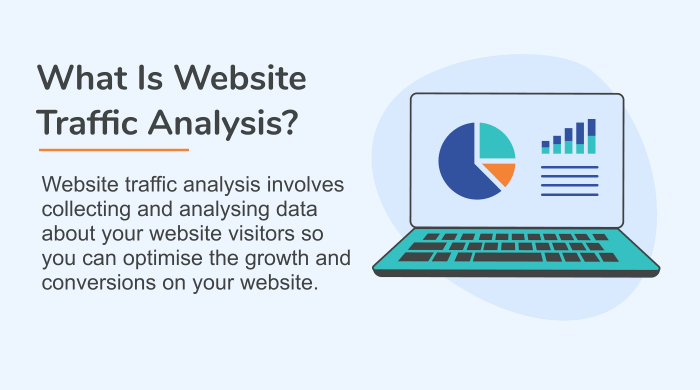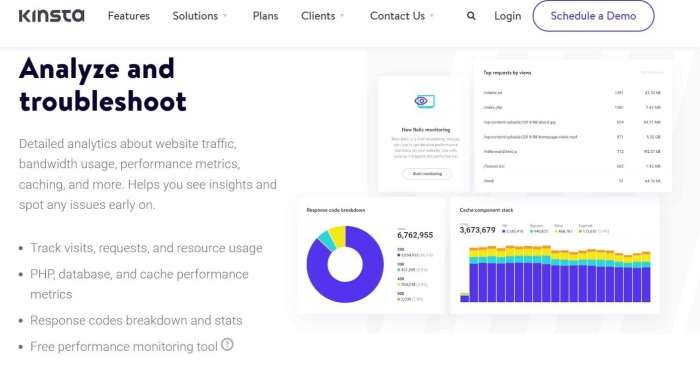Yo, check it – Analyzing Website Traffic is the key to unlocking the potential of your online presence. Dive into this guide filled with insights and tips to elevate your website game!
Get ready to rock the digital world with a deep dive into understanding website traffic and how it can revolutionize your online strategies.
Importance of Website Traffic Analysis: Analyzing Website Traffic

Analyzing website traffic is like checking out who’s checking you out, you dig? It’s crucial for businesses to know who’s visiting their site, where they’re coming from, and what they’re up to. It’s like having a secret spy who tells you all about your audience without them even knowing.
Improving Marketing Strategies, Analyzing Website Traffic
When you dive deep into your website traffic analysis, you can uncover some real gems to level up your marketing game. You can see which pages are a hit and which ones are a miss, helping you tailor your content to what your audience craves. It’s like having a crystal ball to predict what will resonate with your peeps.
Understanding User Behavior
Getting into the nitty-gritty of user behavior through traffic analysis is like getting a front-row seat to a killer show. You can see how long people hang around, what they click on, and where they drop off. This insight is pure gold for tweaking your site to keep them hooked and coming back for more.
Tools for Analyzing Website Traffic
When it comes to analyzing website traffic, there are several popular tools available in the market that businesses can leverage to track and measure website performance.
Google Analytics
Google Analytics is one of the most widely used tools for analyzing website traffic. It provides businesses with valuable insights into their website’s performance, including the number of visitors, their demographics, behavior on the site, and more. Businesses can use Google Analytics to track key performance indicators (KPIs) and make data-driven decisions to improve their online presence.
Adobe Analytics
Adobe Analytics is another powerful tool that businesses can use to analyze website traffic. It offers advanced features for tracking and measuring user behavior on a website, allowing businesses to gain a deeper understanding of their audience and optimize their digital marketing strategies accordingly.
SEMrush
SEMrush is a comprehensive marketing toolkit that includes features for analyzing website traffic, conducting research, and tracking competitors. Businesses can use SEMrush to identify opportunities for improving their search engine optimization () efforts and driving more traffic to their website.
SimilarWeb
SimilarWeb is a competitive intelligence tool that provides businesses with valuable insights into their website traffic and that of their competitors. It offers data on traffic sources, referral sites, and audience demographics, helping businesses benchmark their performance and identify areas for improvement.
How Businesses Can Leverage These Tools
Businesses can leverage these website analytics tools to track and measure website performance by regularly monitoring key metrics such as website traffic, bounce rate, average session duration, and conversion rate. By analyzing this data, businesses can identify trends, spot opportunities for improvement, and make informed decisions to optimize their online presence and drive better results.
Key Metrics to Track in Website Traffic Analysis

When analyzing website traffic, there are several key metrics that businesses should monitor to understand user engagement and make data-driven decisions.
1. Traffic Source
- Essential to track where your website traffic is coming from, whether it’s organic search, social media, referrals, or direct visits.
- Understanding the traffic sources helps businesses allocate resources effectively and focus on channels that drive the most traffic.
- For example, if most of your traffic is coming from social media, you may want to invest more in social media marketing campaigns.
2. Bounce Rate
- Measures the percentage of visitors who navigate away from your site after viewing only one page.
- A high bounce rate may indicate that your website content or user experience needs improvement.
- By analyzing bounce rates for different pages, businesses can identify areas for optimization to keep visitors engaged.
3. Average Session Duration
- Shows the average amount of time visitors spend on your website.
- A longer average session duration typically indicates higher engagement and interest in your content.
- Businesses can use this metric to assess the effectiveness of their website in capturing and retaining visitor attention.
4. Conversion Rate
- Measures the percentage of visitors who complete a desired action, such as making a purchase or signing up for a newsletter.
- A high conversion rate indicates that your website is effectively converting visitors into customers or leads.
- By tracking conversion rates, businesses can optimize their website to improve conversion performance and drive business growth.
Strategies for Improving Website Traffic
To boost your website traffic, you need to implement effective strategies that will attract more visitors and increase your online presence. Here are some tips to help you optimize your content and drive organic traffic through .
Optimizing Content to Attract More Visitors
- Create high-quality, engaging content that is relevant to your target audience. This can include blog posts, videos, infographics, and more.
- Use relevant s and phrases throughout your content to improve search engine visibility and attract organic traffic.
- Regularly update and refresh your content to keep it current and appealing to visitors. This can also help improve your search engine rankings.
- Promote your content through social media channels and email marketing to reach a wider audience and drive more traffic to your website.
The Role of in Driving Organic Traffic
- (Search Engine Optimization) plays a crucial role in driving organic traffic to your website by improving your search engine rankings.
- Optimize your website with relevant s, meta tags, and descriptions to make it easier for search engines to index and rank your content.
- Build quality backlinks from reputable websites to increase your website’s authority and boost organic traffic.
- Regularly monitor your website’s performance through analytics tools to track your efforts and make necessary adjustments to improve your organic traffic.

